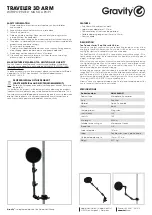
FRONT PANEL - CHANNEL 2 Continued
BASS
The Bass control governs the low-end equalization of your sound. The control provides a range of +/-10dB of boost and cut,
covering a range of approximately 20 Hz to 300 Hz. Using this control, you can shape the bottom end so that your instrument
sounds thumpy or solid or even thin (when you excessively cut the bass). The Bass knob can also be helpful in eliminating low-
end feedback, especially in guitars equipped with internal microphones.
MID
The Mid control affects the midrange frequencies from approximately 750 Hz to 1,500 Hz, with a boost/cut range of +/-10dB.
Midrange is a very important component of an instrument’s tone; especially with guitars, cellos, and banjos, in which a great
deal of their energy comes from this range. Boosting midrange can accentuate the “meat” in an instrument’s tone, while cutting
it can give a “scooped-out” tone that makes acoustic guitars, in particular, sound boomy yet bright.
TREBLE
The Treble control allows you to shape the high-frequency content of your sound. It governs the range from 3,000 Hz to 20,000
Hz and has a boost/cut range of +/-10dB. Overly bright instruments (12-string guitars, mandolins, etc.) can be tamed with a
slight roll-back on the Treble control. Of course, if you want an edgier sound, or need more highs, you can also boost the highs.
Be careful with how much treble you add, since it’s easy to overdo it. Very often, your ears will gradually tune out extra bright-
ness, even if your audience doesn’t. In addition, if the Acoustic Performer Pro is on the floor, or facing away from you, you may
not be aware of just how bright the tone is. Finally, boosting the treble by exaggerated amounts can increase the noise in
effects and preamplifiers and also increase the likelihood of feedback, especially if you stand very close to the Acoustic
Performer Pro.
NOTE: If you need more treble than the Treble control can provide, you may need to adjust the Tweeter Level control on the
rear panel of the Acoustic Performer Pro.
The Fishman Acoustic Performer Pro has a custom-designed digital reverb built into it. Unlike spring-type reverbs, the sound is natural, without
springy, metallic undertones. There are five different reverb types, each with its own decay time and tonal coloration.
ABOUT REVERBERATION: Reverberation is a natural phenomenon in large rooms, halls, etc., where sound can bounce off walls, ceilings, and
floors. Small rooms have their own reverb sound and cathedrals have theirs. Sometimes, artificially created reverb can take the “dryness” out of a
sound, such as a solo instrument in a room that has a lot of carpeting, drapes, and other sound-absorbing materials. Adding reverb can make an
instrument sound larger, more full of life. Too much can make instruments sound distant or as if they were being played in a cave (an effect you
might actually like).
A
C
O
U
S
T
I
C
P
E
R
F
O
R
M
E
R
P
R
O
10
F R O N T P A N E L
R E V E R B










































